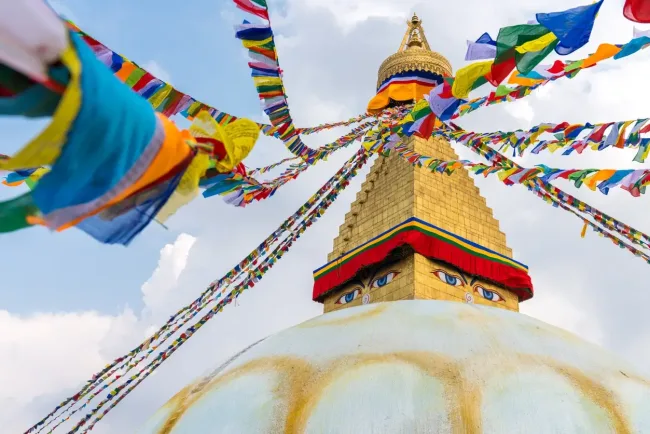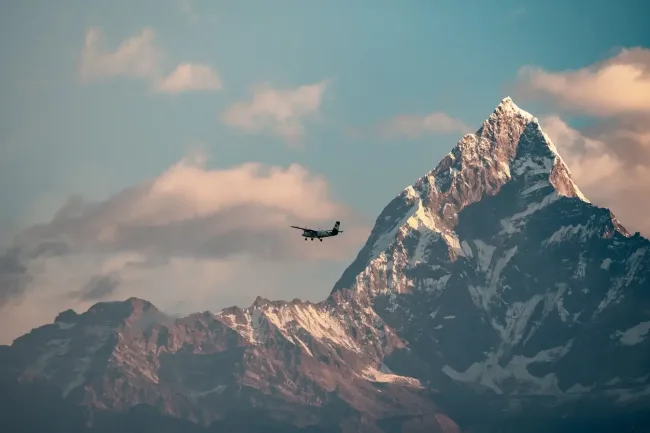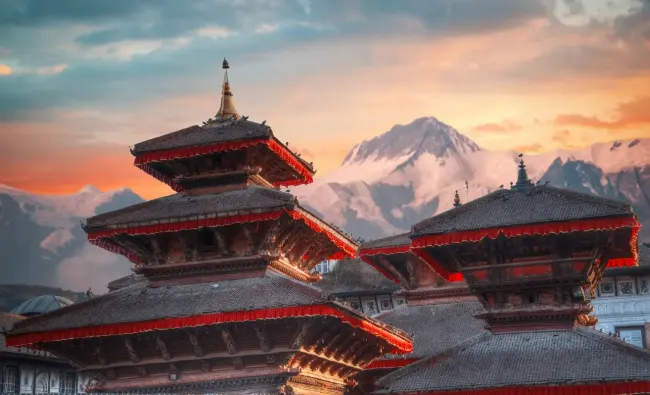
Nepal
Welcome to Nepal
Traveling to Nepal? You may need a visa – find out if you do, which type, and how to apply so you can get the paperwork out of the way and focus on your trip.

What’s a Nepal Visa on Arrival and who’s it for?
Who’s the Nepal Visa on Arrival for?
Travelers from all over the world, except those listed in the next section.
Who’s not eligible for the Nepal Visa on Arrival?
People from the following countries aren't eligible for the visa on arrival. They must apply at the nearest Nepalese Embassy or Consulate to get their visa:
- Nigeria, Ghana, Zimbabwe, Swaziland, Cameroon, Somalia, Liberia, Ethiopia, Iraq, Palestine, Afghanistan, Syria, and any travelers with a temporary passport or refugee travel document.
Travelers from the following countries are exempt from requiring a visa to enter the country:
-
India – Can reside permanently in the country without restrictions.
-
Thailand – Exemption up to 90 days.
-
Russian Federation – Exemption up to 90 days.
-
People's Republic of China – Exemption up to 30 days.
-
Federal Republic of Brazil – Exemption up to 90 days.
-
Myanmar – Exemption up to 90 days.
-
Vietnam – Exemption up to 90 days.
-
Cambodia – Exemption up to 30 days.
-
Mongolia – Exemption up to 90 days.
-
Jordan – Exemption up to 90 days.
-
Israel -– Exemption up to 90 days.
-
Georgia – Exemption up to 90 days.
-
Qatar – Exemption up to 90 days.
Note that this info can change over time, so it's always a good idea to double-check via our Visa Checker Tool.
What’s the purpose of the Nepal Visa on Arrival? Visits to the country for tourism.
Also note you can only use this option via the following entry points:
-
Tribhuvan International Airport, Kathmandu.
-
Birganj (India border).
-
Bheemdatta (India border).
-
Dhangadhi (India border).
-
Nepalgunj (India border).
-
Kakarbhitta (India border).
-
Kodari (China border/Zhangmu Port, currently available for cargo only).
-
Siddharthanagar (India border).
How long can you stay with a Nepal Visa on Arrival?
The visa on arrival is a Multiple entry document issued for a stay of 15, 30, or 90 days for each visit.
What’s a Nepal Embassy Visa and who’s it for?
Who’s the Nepal Embassy Visa for?
Travelers from Nigeria, Ghana, Zimbabwe, Swaziland, Cameroon, Somalia, Liberia, Ethiopia, Iraq, Palestine, Afghanistan, and Syria.
Who’s not eligible for the Nepal Embassy Visa?
Travelers eligible for the Visa on Arrival or that are visa-exempt from entering Nepal (see Visa on Arrival section).
What’s the purpose of the Nepal Embassy Visa? Visits to the country for tourism.
How long can you stay with a Nepal Embassy Visa?
The validity of this visa depends on your nationality and your situation. It's determined upon application.
At iVisa, we currently don’t offer the Embassy Visa. For more information on how to apply, visit the Nepal government website.
What’s a Nepal Business Visa and who’s it for?

Who’s the Nepal Business Visa for? This visa is available for almost all nationalities, except those who require an embassy visa or who are visa-exempt to enter the country.
What’s the purpose of the Nepal Business Visa? This visa allows you to attend meetings and conferences, negotiate deals, or conduct business transactions in Nepal.
How long can you stay with a Nepal Business Visa? The Business Visa is a multiple-entry document issued for a period between one month and one year, depending on the investment made in the country. Each stay can last up to 60 days per entry. The exact validity will be determined upon application.
At iVisa, we currently don’t offer the Business Visa. For more information on how to apply, visit the Nepal government website.
What’s a Nepal Transit Visa and who’s it for?
Who’s the Nepal Transit Visa for? This visa is available for almost all nationalities, except those who require an embassy visa or who are visa-exempt to enter the country.
What’s the purpose of the Nepal Transit Visa? Transiting through Nepal. You can leave the airport with this visa.
How long can you stay with a Nepal Transit Visa? You can spend up to 24 hours in the country.
At iVisa, we currently don’t offer the Transit Visa. For more information on how to apply, visit the Nepal government website.
What are the Nepal long-term visa options?

Nepal offers several long-term visa options for various purposes, such as employment, study, business, and residence. Here are some of the common long-term visas:
-
Working Visa: Perfect for those seeking employment or professional opportunities in Nepal. The Working Visa allows you to live and work in this beautiful country. It's your key to experiencing Nepal's culture while advancing your career.
-
Press Visa: Ideal for journalists and media professionals, the Press Visa is designed for those who wish to report on and capture Nepal's captivating stories and landscapes. This visa ensures you stay connected and legally compliant while on assignment.
-
Relationship Visa: The Relationship Visa is a heartwarming opportunity for those with family ties in Nepal. It enables you to reside in the country, maintaining close bonds with your loved ones in this culturally rich nation.
-
Marriage Visa: Celebrating love and union, the Marriage Visa is for individuals married to Nepalese citizens, allowing them to live and experience life together in Nepal. It's a passport to a new life in a country rich in tradition and natural beauty.
-
Residential Visa: If you want to make Nepal your home away from home, the Residential Visa is perfect for you. This visa is available for investors, people with an outstanding international reputation, or those who can contribute significantly to the economy.
-
Study Visa: For students and academics eager to pursue education in Nepal's unique academic environment, the Study Visa is your gateway to learning amidst the backdrop of the Himalayas.
-
Official Visa: Meant for spouses and children of government officials or representatives visiting Nepal for official purposes, the Official Visa ensures a smooth and protocol-aligned stay in the country.
-
Diplomatic Visa: Tailored for diplomats and senior officials engaging in diplomatic activities in Nepal, the Diplomatic Visa facilitates a respectful and secure environment for your important missions and engagements.
At iVisa, we currently don’t offer long-term visas for Nepal. For more information on how to apply, visit the Nepal government website.
Staying healthy in Nepal: Here’s what you need to know
Healthcare facilities and standards in Nepal can vary depending on the location and the type of facility. Here's what travelers should know.
Make sure to stay updated on routine vaccines
-
Typically, recommended vaccines include diphtheria, hepatitis A and B, tetanus, rabies, and typhoid.
-
Cholera and Japanese encephalitis vaccines may be selectively advised for those at the highest risk.
-
A yellow fever vaccination certificate is required for travelers aged one year or over arriving from countries with a risk of yellow fever transmission.
-
Keep updated with Nepal's COVID-19 requirements, such as quarantine, testing, or vaccine certificates, through your airline or the Nepalese government website.
Medical facilities
-
In cities like Kathmandu and Pokhara, you can find well-equipped hospitals and clinics, often with English-speaking staff and access to various medical services.
-
In remote and rural areas, health facilities are more basic, and access to healthcare can be limited.
-
Purchasing medicines from reputable pharmacies, preferably those attached to hospitals or larger medical centers, is advisable.
Health insurance
We’d always recommend taking out health insurance before you travel anywhere from any destination.
Contact your insurance provider before traveling to ensure you have the right level of coverage.
Other things to consider:
-
Trip cancellation, delay, and interruption benefits.
-
Medical expenses and medical evacuation benefits.
-
Baggage coverage.
Things to be aware of when visiting Nepal
Keep an extra eye on the following to keep healthy and safe during your trip to Nepal:
1. Food and waterborne illnesses: Travelers' diarrhea, typhoid, and hepatitis A are common due to contaminated food and water. Stick to bottled or treated water and well-cooked food.
2. Altitude sickness: This is a significant risk in high-altitude areas, especially for trekkers in the Himalayas. It's crucial to acclimatize appropriately and consider preventive medication.
3. Injuries: Road accidents and trekking injuries are common. Be cautious when traveling on roads, and be well-prepared for long hikes.
Medication for personal use
Follow these tips to bring into Nepal some over-the-counter medicines:
-
Declare all medications: Report all medicines for personal use to customs authorities.
-
Original packaging: Always keep medicines in their original containers and transparent bags in your hand luggage.
-
Prescription or doctor's letter: Present the medical prescription issued by your doctor or other competent authority in English.
-
Check for restrictions: Call Nepal's embassy to verify that all of your prescriptions are legal to bring with you.
-
Quantity aligned with itinerary: Bring only a reasonable quantity that aligns with the duration of your stay to avoid complications.
Related Articles


 Australia ETA Online
Australia ETA Online
 United Kingdom ETA
United Kingdom ETA
 India Tourist eVisa
India Tourist eVisa
 Canada ETA Visa
Canada ETA Visa
 Turkey eVisa
Turkey eVisa
 Egypt eVisa
Egypt eVisa
 Singapore SG Arrival Card
Singapore SG Arrival Card
 Indonesia eVoa Visa
Indonesia eVoa Visa
 Aruba ED Card
Aruba ED Card
